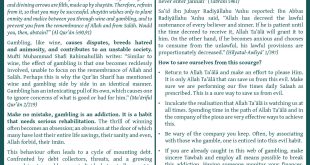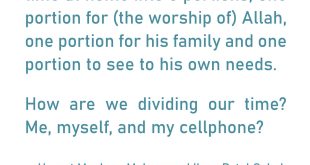For a moment, let us examine what happens at an interfaith prayer. A Muslim is expected to make Du’ā to Allāh Ta’ālā, while the disbelievers remain silent and pay respect. After that, a jew, christian, or hindu prays to his ‘deity’, and the Muslim is expected to listen attentively and pay respect.
Calling unto anyone besides Allāh Ta’ālā is a most severe crime. Here, a Muslim is witnessing clear kufr being perpetrated before him. A deity other than Allāh Ta’ālā is being called upon in his presence. What does his Imān direct him to do? Let alone accept an invitation to attend such a gathering and be a part thereof; if a believer finds himself in such a situation, he is directed to stop the evil or, at the very least, leave that gathering.
Allāh Ta’ālā says in the Qur’ān Karīm: “And He has revealed to you in the book that when you hear the verses of Allāh being denied or ridiculed, you should not sit with them unless they engage in other discourse. Or else you will be like them. Surely, Allāh Ta’ālā will gather the hypocrites and disbelievers in Jahannam.” (Al-Qur’ān 4/140)
In Ma’āriful Qur’ān, under the heading ‘Being satisfied with disbelief is disbelief’, Mufti Shafi Rahmatullāhi ‘Alayh explains that: ‘The phrase “or else You will be like them” warns that by willingly attending gatherings where Allāh Ta’ālā’s word is rejected, ridiculed or distorted, a person is rendered guilty of the same sin and part of them (by association). “Becoming like them” can either be explained as, Allāh forbid, your thoughts and feelings are such that they reflect approval of their expressions of Kufr, then you too become a disbeliever because liking Kufr is akin to Kufr. Or, if that is not the case, then “being like them” would mean that by participating in these gatherings with those who seek to harm Islām and the Muslims and falsify their Din, Allāh forbid, a person, through his “assistance” becomes like them (i.e. he becomes an accessory to their harmful schemes). (Ma’āriful Qur’ān Vol 2 pg 586)
DOES INTERFAITH DIALOGUE PAVE THE WAY TO APOSTASY (DISBELIEF)?
For centuries, our pious predecessors understood the importance of preserving and transmitting Deen in its pure and unaltered state for future generations.
Consequently, numerous safeguards were carefully established, protecting the faith of successive generations and preserving their Imān. The Ummah always understood that a Muslim can never participate in a prayer where Kufr is being perpetrated. Many a parent went to great lengths to ensure that their children were exempt from participating in prayers at school, fearing that this may erode the Imān of their impressionable young children. The church, synagogue, and temple were decidedly out of bounds for a Muslim. A dislike for these places was cultivated at a tender age. Alhamdulillāh, in this way, Muslims were saved from Irtidād (Turning away from Islām), and Dīn reached us in its most pure form.
Now, the participation of Muslims, and especially ‘Ulamā, at interfaith prayers, which are often held in churches, threatens to destroy these carefully erected barriers. The Ālim attending an interfaith prayer may say that his personal convictions remain unchanged and he doesn’t have any reverence in his heart for kufr. However, what message does his silent participation in interfaith prayers convey to the Muslim community? Why should parents opt their children out of christian school prayers when prominent Islāmic scholars participate in similar interfaith events? Why should Muslims refrain from entering churches when prominent Islāmic scholars participate in interfaith events there? What objections can there be to hinduism if an Ālim willingly attends and sits through hindu prayers? What makes Islām unique when Moulana “XYZ” participates in interfaith prayers alongside representatives of other faiths? Why should Muslims refrain from joining interfaith prayers at local churches or schools when influential scholars participate in similar events?
By removing these barriers, we expose future generations to Irtidaad (turning away from Islām). May Allāh Ta’ālā protect us and our progeny, Āmīn.
AN IMPORTANT DU’AA
When Sayyiduna ‘Umar Radiyallāhu ‘Anhu presented a scripture from the people of the past before Rasulullāh Sallallāhu ‘Alayhi wa Sallam, he became angry. The anger of Nabi Sallallāhu ‘Alayhi wa Sallam only subsided when Sayyiduna ‘Umar Radiyallāhu ‘Anhu began reciting:
رَضِيْتُ بِاللهِ رَبًّا وَبِالْإِسْلَامِ دِيْنًا وَبِمُحَمَّدٍ نَبِيًّا وَّرَسُوْلًا
“Radhitu billāhi rabba wa bil Islāmi deena wa bi muhammadin sallallāhu ‘Alayhi wa sallam nabiyyaw wa rasoola”
(I am pleased with Allāh as my Rabb, Islām as my religion, and with Nabi Muhammad Sallāllahu ‘Alayhi wa Sallam as the Nabi and messenger of Allāh.) (Majma’uz Zawāid 1/178)
Whenever we encounter instances of disbelief, such as hindu processions, christian prayers, jewish rituals, or any worship contradicting Islāmic teachings, we should move away from that place and recite the same Du’aa.
رَضِيْتُ بِاللهِ رَبًّا وَبِالْإِسْلَامِ دِيْنًا وَبِمُحَمَّدٍ ﷺ نَبِيًّا وَّرَسُوْلًا
May Allāh Ta’ālā grant us the true understanding of Dīn and may He save us from being a means of evil spreading in the Ummah of Nabi Sallallāhu ‘Alayhi wa Sallam. Āmīn
10 Jumādal Ula 1446
04 November 2024
A0046/2
 Wifāq ul Ulāma (SA) ASSOCIATION OF SOUTH AFRICAN 'ULAMA
Wifāq ul Ulāma (SA) ASSOCIATION OF SOUTH AFRICAN 'ULAMA



